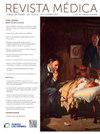甲状腺风暴引发心肺骤停:病例报告
IF 0.4
Q4 MEDICINE, GENERAL & INTERNAL
引用次数: 0
摘要
导言甲状腺风暴是一种罕见但致死率极高的疾病。病例报告:一名 35 岁的男性患者,既往无病史,两周前出现心悸和上腹痛,24 小时后突然加重,伴有恶心和全身乏力。在送往急诊科的途中,他的心肺功能骤停,住院期间出现多器官功能衰竭。家人报告说他最近出现了甲状腺功能亢进症状,因此考虑诊断为甲状腺风暴。甲状腺功能检查显示游离 T4 水平高于 7.7 ng/dl,促甲状腺激素水平低于 0.005 μIU/ml。患者接受了噻马唑、氢化可的松和普萘洛尔治疗,病情进展良好。讨论与结论甲状腺风暴的及时诊断至关重要,因为早期处理和检测可减少并发症和死亡率。一旦确诊,应立即采取抢救措施和药物治疗,以减轻甲状腺激素的影响。本文章由计算机程序翻译,如有差异,请以英文原文为准。
Tormenta tiroidea desencadenante de paro cardiorrespiratorio: reporte de caso
Introduction
A thyroid storm is a rare but highly lethal disease. It is characterized by exaggerated symptoms of hyperthyroidism, and it can lead to multiorgan failure and cardiopulmonary arrest.
Case Report
A 35-year-old man with no prior medical history presented with a two-week history of palpitations and epigastric pain, which abruptly worsened over 24 hours, accompanied by nausea and diaphoresis. During transportation to the emergency department, he experienced cardiopulmonary arrest and multiorgan failure during his hospitalization. Family reported recent hyperthyroid symptoms led to the consideration of a thyroid storm diagnosis. Thyroid function tests revealed a free T4 level greater than 7.7 ng/dl and a TSH level less than 0.005 μIU/ml. The patient was treated with thiamazole, hydrocortisone, and propranolol, showing favorable progression.
Discussion and Conclusion
Opportune diagnosis of a thyroid storm is crucial, as early management and detection reduce complications and mortality. Once suspected, resuscitation measures and pharmacological treatment should be initiated to mitigate the effects of thyroid hormones.
求助全文
通过发布文献求助,成功后即可免费获取论文全文。
去求助
来源期刊

Revista Medica Clinica Las Condes
MEDICINE, GENERAL & INTERNAL-
CiteScore
0.80
自引率
0.00%
发文量
65
审稿时长
81 days
 求助内容:
求助内容: 应助结果提醒方式:
应助结果提醒方式:


